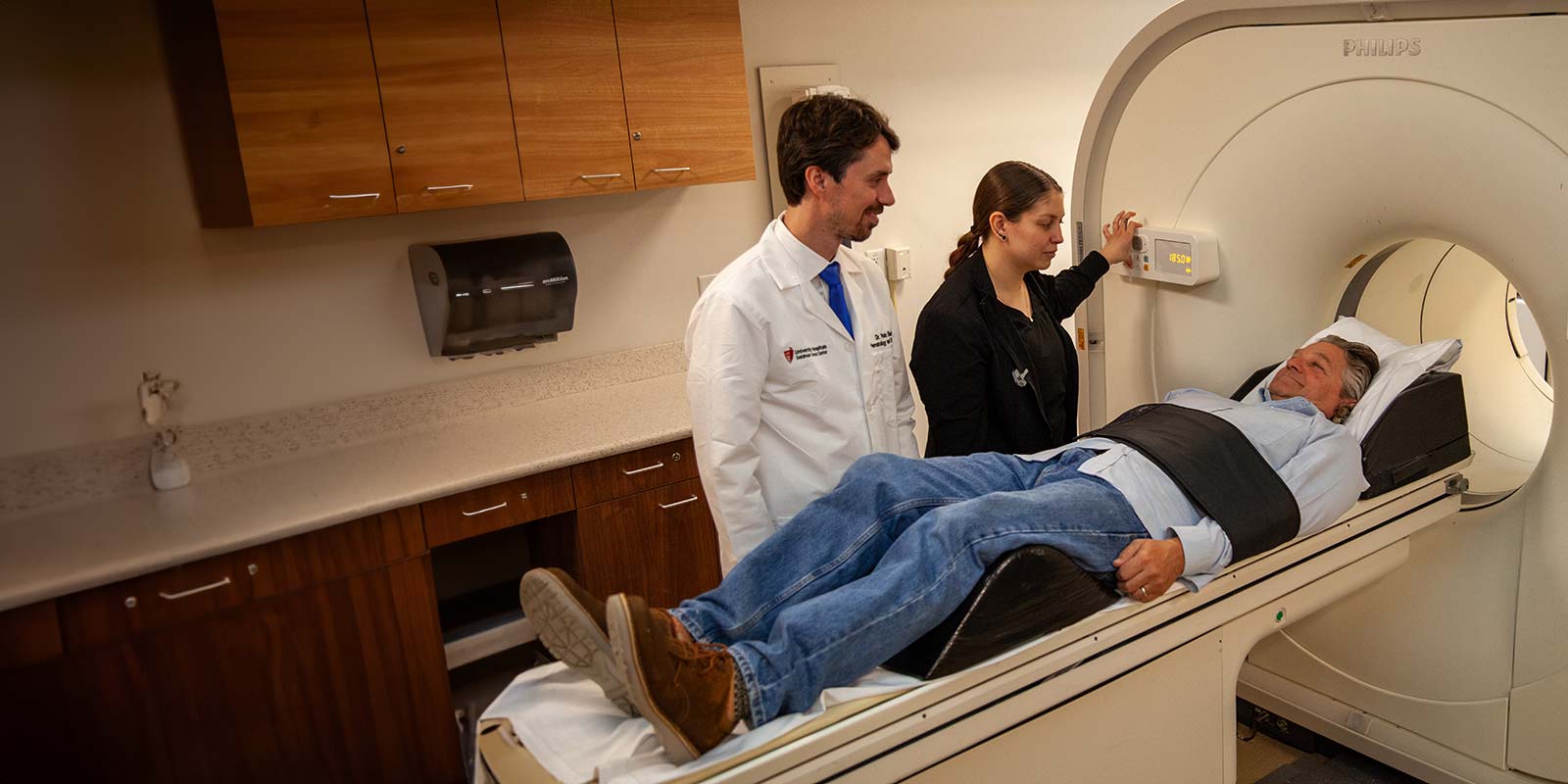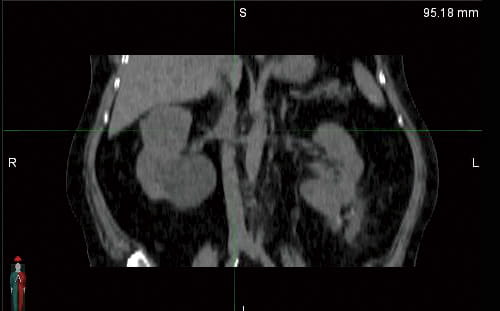
Expert Care From World-Class Kidney Cancer Specialists
University Hospitals Seidman Cancer Center has a dedicated team of experienced kidney cancer specialists who work together to deliver the best kidney cancer treatment. With world-renowned urology specialization, we collaborate on weekly tumor board reviews to enhance your care using the latest treatment innovations.
Your health is important. Get expert care.
Offering in-person, video and telephone visits. Call 216-844-3951 today to see which option is right for you.Learn more about virtual visit
Make an Appointment
What Is Kidney Cancer?
The kidneys are two bean-shaped organs located on either side of the spine just below the ribcage. They remove waste products and extra water from the blood as urine, filtering about 45 gallons of blood per day. Also called renal cancer, kidney cancer occurs when healthy cells in one or both kidneys begin to multiply out of control. Over time, these cells form a mass (a tumor). A cancerous (malignant) tumor can spread to other parts of the body through a process called metastasis.
Kidney cancer accounts for about 3 percent of all adult cancers in the U.S., with about 30,000 new cases diagnosed every year. It is the third most common urologic cancer.
Types of Kidney Cancer
Renal Cell Carcinoma
Also called renal cell cancer or renal cell adenocarcinoma, renal cell carcinoma (RCC) is the most common form of kidney cancer. RCC accounts for about 9 out of 10 kidney cancers. RCC most often grows as a single tumor within one kidney. Sometimes RCC develops as multiple tumors in one or both kidneys.
There are several types of RCC, based on how the cancer cells appear under a microscope:- Clear Cell Renal Cell Carcinoma (ccRCC)
-
Also called conventional renal cell carcinoma, ccRCC cells look like clear soap bubbles when viewed under a microscope. ccRCC forms in the cells that line the tiny tubes inside the kidneys (tubules) that help filter waste products from the blood. This subtype accounts for up to 85 percent of all RCC cases.
- Non-Clear Cell Renal Cell Carcinoma (ncRCC)
-
The nnRCC group comprises several rare RCC subtypes, including:
- Papillary Renal Cell Carcinoma (PRCC): This cancer forms in the cells lining the kidney tubules. Most PRCC tumors appear as long, thin finger-like growths when viewed with a microscope. PRCC accounts for 10 to 15 percent of RCCs.
- Chromophobe renal cell carcinoma (ChRCC): This cancer forms in the cells lining the kidney tubules. ChRCC accounts for 5 to 10 percent of RCCs. ChRCC cells are typically light-colored, but tend to be larger than ccRCC cells.
- Collecting Duct Carcinoma (CDC): A rare and aggressive form of kidney cancer, CDC develops in the kidney’s collecting duct, a vessel that takes urine from the kidney to the ureter and the bladder. Many people with CDC do not experience symptoms until the cancer is at an advanced stage.
- Renal Medullary Carcinoma (RMC): RMC is a rare, aggressive form of kidney cancer that primarily afflicts young people of African descent who have sickle cell disease or carry the sickle cell trait. In most cases, RMC is associated with genetic mutations that cause red blood cells in the renal medulla (the inner part of the kidney) to become rigid and have a curved, sickle-like shape.
- Translocation RCC (TRCC): This ncRCC subtype usually grows slowly, without causing symptoms. TRCC is found more often in children and young adults than older adults and is slightly more common in females than males. However, when TRCC occurs in older adults, it tends to be more aggressive or fast-growing.
- Unclassified ncRCCs: Unclassified ncRCCs consist of a group of kidney cancers that have molecular differences that prevent them from being grouped into one of the other ncRCC classifications.
Renal Sarcoma
Renal sarcomas is a rare form of kidney cancer that begins in the soft tissues of the kidney, including the blood vessels and the connective tissue that encapsulates the organ. These tumors account for less than 1 percent of all kidney cancers.
Wilms Tumor
Also called nephroblastoma, Wilms tumor is a rare kidney cancer that primarily affects children. It is the most common kidney cancer found in children. Wilms tumor typically affects children ages 3 to 4, but it can occur in older children and adults.
Hereditary Kidney Cancer
Kidney cancer risk is typically not passed down from parent to child. Hereditary kidney cancer, which accounts for about 5 to 8 percent of all kidney cancers, is usually linked to other inherited syndromes.
Urothelial Cancer
Urothelial cancer (UC), also known as transitional cell carcinoma (TCC), is cancer that begins in the urothelial cells that line the renal pelvis, urethra, bladder and other parts of the urinary tract. Urothelial cells are transitional cells that can change shape and stretch without breaking, allowing the urinary tract to expand to store and move urine.
The renal pelvis is the area at the center of the kidney that collects and funnels urine into the ureter, the long tube that connects the kidneys to your bladder. Transitional cell cancer of the renal pelvis and ureter is a rare urinary tract cancer that primarily affects adults ages 65 and older.

Kidney Cancer Symptoms
Kidney cancer symptoms often don’t occur until the tumor is large and may include:
- Blood in the urine (hematuria)
- Pain in the lower back on one side
- A mass (lump) on the side or lower back
- Fatigue
- Loss of appetite
- Unexplained weight loss
- Fever that is not caused by an infection and doesn’t go away
- Anemia (low red blood cell count)
These symptoms can be caused by a number of conditions other than kidney cancer. If you have any of these symptoms, see a doctor to determine their cause.
Expert Diagnostic Capabilities
Most kidney tumors are discovered incidentally during imaging tests done for other reasons. If your doctor suspects you have kidney cancer, diagnostic tests may include:
- Blood and urine laboratory tests:
- While not used to diagnose kidney cancer directly, a blood test can sometimes be the first indicator that a person has a kidney issue. For an individual who has already been diagnosed with kidney cancer, blood tests are done to get a sense of their overall health and to help see if their cancer has spread outside the kidney.
- A standard urine test (urinalysis) can show if someone has blood in their urine, a common symptom of kidney cancer. Also, a test called a urine cytology is done to look for cancer cells in the urine of people who have a tumor in the renal pelvis (the middle part of the kidney).
- Intravenous pyelogram (IVP): A set of X-rays of the kidney, ureters and bladder with injection of a contrast dye into a vein to detect tumors and other abnormalities and to assess renal blood flow.
- Renal angiography (or arteriography): A series of X-rays where contrast dye in introduced into catheter placed into the blood vessels of the kidney to detect signs of blockage or other abnormalities affecting the kidney’s blood supply.
- Other imaging tests, including positron emission tomography (PET) scan with tracer , computed tomography scan (also called CT or CAT scan), magnetic resonance imaging (MRI), chest X-ray, ultrasound (also called sonography) and bone scan.
Based on the results of your diagnostic testing, a biopsy may be needed. A biopsy removes a sample of the tumor for further evaluation.
What Causes Kidney Cancer?
Certain factors can increase the risk of developing kidney cancer, including:
Older Age
Kidney cancer risk increases with age.
Smoking
Smokers have a higher risk of kidney cancer than nonsmokers. This risk decreases after quitting.
Obesity
People who are obese are more likely to get kidney cancer than people who are normal weight.
High Blood Pressure
Also called hypertension, high blood pressure is associated with an elevated risk of kidney cancer.
Treatment for Kidney Failure
Individuals who require long-term dialysis to treat chronic kidney failure are at a higher risk of developing kidney cancer.
Family History of Kidney Cancer
Your risk of kidney cancer is higher if you have close family members with the disease.
Certain Inherited Syndromes
People born with certain inherited syndromes may have an increased risk of kidney cancer. These syndromes include Birt-Hogg-Dube syndrome, von Hippel-Lindau disease, tuberous sclerosis complex, hereditary papillary renal cell carcinoma and familial renal cancer.

Treatments for Improved Outcomes in Kidney Cancer
If you’ve been diagnosed with kidney cancer, our urology specialists will design a customized treatment plan based on the type and stage of cancer, your age and your overall health. We take an evidence-based approach to kidney cancer care, offering the latest advances in treatments, including immunotherapy, targeted therapies, robotic surgery, stereotactic radiosurgery and proton therapy.
Kidney Cancer Survival Rates
The 5-year survival rate for kidney cancer is 77.6 percent. The 5-year survival rate changes based on a variety of factors:
Importantly, survival rates vary widely from one person to another, depending on the type and stage of cancer as well as their overall health. Average survival rates also don’t reflect the most recent advances in kidney cancer treatment.
Access to Kidney Cancer Specific Research and Clinical Trials
The cancer team at UH Seidman Cancer Center is discovering the next generation of innovations in kidney cancer care. Our experts are on the Renal Task Force for the National Cancer Institute to evaluate national and international research opportunities to improve care. In addition, University Hospitals participates in the International Radiation Oncology Consortium for Kidney (IROCK) to gather data to improve outcomes in kidney cancer patients treated with stereotactic radiosurgery.
UH Seidman Cancer Center offers kidney cancer clinical trials for eligible patients. By receiving your care at an academic medical center such as University Hospitals, you can receive access to cutting-edge treatments that may not be available elsewhere.
Why Choose UH Seidman Cancer Center for Kidney Cancer Care?
For over 20 years, UH Seidman Cancer Center has been ranked one of the best cancer hospitals in the country by U.S. News & World Report.
UH Seidman Cancer Center is part of the NCI-designated Case Comprehensive Cancer Center, one of 57 NCI-designated comprehensive cancer centers in the country. The Case Comprehensive Cancer Center has an “Exceptional” rating from the NCI, a distinction currently held by only seven NCI-designated comprehensive cancer centers.
Surgeons at UH Seidman Cancer Center perform partial and complete nephrectomies using the da Vinci robotic surgery system, which provides optimal precision, range of motion and visibility of the surgical field.
Radiation Oncologists at UH Seidman Cancer Center utilize SABR (Stereotactic Ablative Radiotherapy) to offer a non-operative, non-invasive approach to treat kidney cancer. This is particularly helpful for patients who are not able to undergo surgery. We also have other advanced, state-of-the-art technologies, such as the Ethos Therapy System, which combines CBCT image guidance and artificial intelligence-based software to deliver precise and effective treatment.
New PET Scan for Better Detection of Kidney Cancer
Kidney tumors are usually detected with imaging tests such as CT and ultrasound or with a biopsy. However, conventional imaging can’t distinguish between benign and malignant tumors, and a biopsy is invasive and can’t detect kidney cancer that has spread.
A new type of PET scan may improve kidney cancer detection. This scan uses a tracer (or imaging agent) called 89Zr-DFO-girentuximab that is injected into the vein prior to the scan. Currently under clinical investigation, this new imaging agent has the potential to become the new standard of care for diagnosing ccRCC, the most common type of kidney cancer. In comparison to more traditional imaging methods, studies have demonstrated that PET scans using this tracer can:
- More accurately detect ccRCC, including the tumor’s size and location.
- Differentiate ccRCC from other types of kidney cancer.
- Detect ccRCC when it’s smaller, possibly before it has a chance to spread.
- Show if the cancer has spread to other parts of the body.


Image of kidneys: PET Scan with new imaging agent (left) compared to CT Scan (right)
While the FDA continues to review clinical data, UH Seidman Cancer Center is one of very few cancer centers in the country that has been granted expanded access to offer PET scans with 89Zr-DFO-girentuximab to patients through a clinical study. If you’ve been diagnosed with a kidney mass, your medical oncologist can determine if you might benefit from participating in the trial. All adult patients found with renal mass in conventional CT scans are eligible to participate in this clinical study.
Make an Appointment
Your health is important. Get expert care.
Offering in-person and virtual visits.
Make an Appointment

